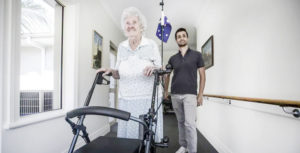
Monday To Friday
A composer and PhD student has released 20 classical music tracks specifically for people with dementia.

“These are important strategies to have, because we know people with dementia can spend up to 40 per cent of their bedtime hours awake.” Other DTA e-learning courses on offer in February are: Bedtime to Breakfast was developed in partnership with Life Care. DTA courses are short, mobile-friendly, and cost...
DTA currently uses different terms for behaviour. We will be progressively moving to the term Changed Behaviour in all our content.
Enrolments are now open for the course, Bedtime to Breakfast, which explores:
The course aims to help night carers provide ‘salutogenic’, person-centred care. Course developer and DTA Knowledge Translation Manager Belinda Goodenough said: “A salutogenic approach is one that focuses on health and wellbeing.
“In a night care context, this may mean planning ahead to ensure things like safe lighting, reduced noise and soothing activities, as well as respecting individual sleep preferences.
Share
Tags
“These are important strategies to have, because we know people with dementia can spend up to 40 per cent of their bedtime hours awake.” Other DTA e-learning courses on offer in February are:
Bedtime to Breakfast was developed in partnership with Life Care. DTA courses are short, mobile-friendly, and cost free to the learner. For more information, visit dta.com.au

A composer and PhD student has released 20 classical music tracks specifically for people with dementia.

New research on the impact of temperature on people living with dementia, supervised by DTA Executive Director Richard Fleming and published in the Conversation.